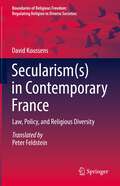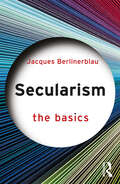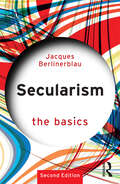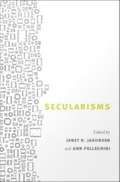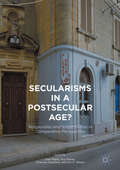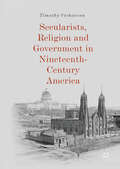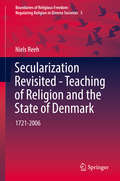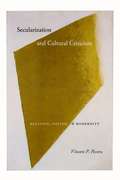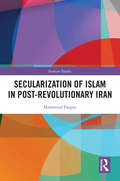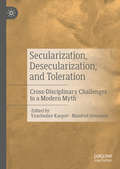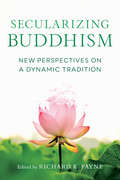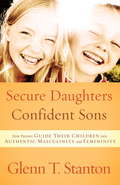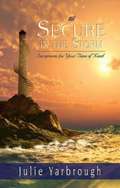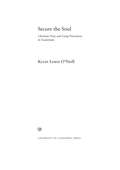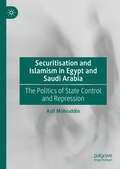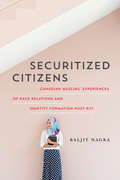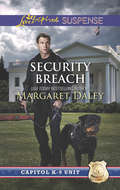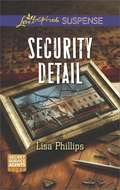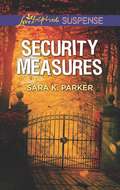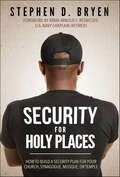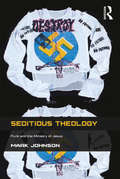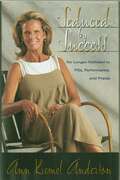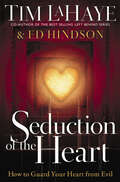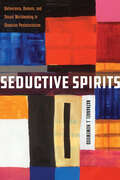- Table View
- List View
Secularism: Law, Policy, and Religious Diversity (Boundaries of Religious Freedom: Regulating Religion in Diverse Societies)
by David KoussensThe increasing visibility of Islam in France and the vehemence of debates about it have often contributed to narrow public perceptions of secularism to a simplistic antireligious crusade, a misleading image disseminated by the media and politicians alike. Taking the opposite stand, this book embarks on a comprehensive effort to document the multiple areas in which French secularism plays out - in debates over “cults,” places of worship, chaplaincy services in public institutions, the recognition of associations of worship, and more -, outlining and analizing the legal paths favored by the state in the regulation of religious diversity. While Islam has undoubtedly contributed to the reshaping of French secularism in the last decades, the book moves beyond what has come to be known as the "Muslim Question" to look at the multiplicity of challenges contemporary religious beliefs, practices, and organizations now pose to the state. David Koussens examines the main political and legal configurations of French secularism over the last thirty years through a sociological and juridical lens, in order to better document its diversity. Such a portrait emphasizes that French secularism is not a univocal phenomenon but one that appears in many guises.
Secularism: The Basics (The Basics)
by Jacques BerlinerblauSecularism: The Basics is a concise and engaging introduction to confusing and contradictory public discussions of secularism across the globe. “Secularism” must be the most confused and convoluted term in the entire global political lexicon. From New York to Paris, to Istanbul, to Addis Ababa, to New Delhi, to Montevideo, there are countless examples of politicians, religious leaders and journalists, invoking the S-word in heated debates about public education, gender, sex, national symbols, and artistic freedom. In this lively and lucid book, Jacques Berlinerblau addresses why secularism is defined in so many ways and why it so ignites people’s passions. In so doing, he explores the following important questions: What does secularism mean? Why should we care about this idea? What are the different types of secularism and what are their histories? What are the basic principles of political secularisms? Why are secularism and Atheism often confused? What is the relationship between secularism and LGBTQ rights? What opposition are secularisms up against? What does the future hold for a concept millennia in the making, but only really operationalized in the twentieth century? With a glossary of key terms, case studies, informative tables, and suggestions for further reading throughout, the book considers key philosophical, religious, anti-religious, post-modern and post-colonial arguments around secularism. This book is an ideal starting point for anyone seeking a readable introduction to the often-conflicting interpretations of one of our era’s most complex and controversial ideas.
Secularism: The Basics (The Basics)
by Jacques BerlinerblauSecularism: The Basics is a concise and engaging introduction to confusing and contradictory public discussions of secularism across the globe. In this lively and lucid book, Jacques Berlinerblau addresses why secularism is defined in so many ways and why it so ignites people’s passions. In so doing, he explores the following important questions: What does secularism mean? Why should we care about this idea? What are the different types of secularism and what are their histories? What are the basic principles of political secularisms? Why are secularism and Atheism often confused? What is the relationship between secularism and LGBTQ rights? What opposition are secularisms up against? What does the future hold for a concept millennia in the making, but only really operationalized in the last century and a half? This thoroughly updated new edition includes two new chapters on African Secularisms and the importance of Mexico in the history of political secularism. With a glossary of key terms, new and updated case studies throughout, informative tables, and suggestions for further reading, the book considers key philosophical, religious, anti-religious, and post-colonial arguments around secularism. This book continues to be an ideal starting point for anyone seeking a readable introduction to the often-conflicting interpretations of one of our era’s most complex and controversial ideas.
Secularisms
by Ann Pellegrini Janet R. JakobsenAt a time when secularism is put forward as the answer to religious fundamentalism and violence, Secularisms offers a powerful, multivoiced critique of the narrative equating secularism with modernity, reason, freedom, peace, and progress. Bringing together essays by scholars based in religious studies, gender and sexuality studies, history, science studies, anthropology, and political science, this volume challenges the binary conception of "conservative" religion versus "progressive" secularism. With essays addressing secularism in India, Iran, Turkey, Great Britain, China, and the United States, this collection crucially complicates the dominant narrative by showing that secularism is multifaceted. How secularism is lived and experienced varies with its national, regional, and religious context. The essays explore local secularisms in relation to religious traditions ranging from Islam to Judaism, Hinduism to Christianity. Several contributors explicitly take up the way feminism has been implicated in the dominant secularization story. Ultimately, by dislodging secularism's connection to the single (and singular) progress narrative, this volume seeks to open spaces for other possible narratives about both secularism and religion--as well as for other possible ways of inhabiting the contemporary world. Contributors: Robert J. Baird, Andrew Davison, Tracy Fessenden, Janet R. Jakobsen, Laura Levitt, Molly McGarry, Afsaneh Najmabadi, Taha Parla, Geeta Patel, Ann Pellegrini, Tyler Roberts, Ranu Samantrai, Banu Subramaniam, Rajeswari Sunder Rajan, Angela Zito
Secularisms in a Postsecular Age?
by Erin K. Wilson Ruy Blanes José Mapril Emerson GiumbelliThis volume ethnographically explores the relation between secularities and religious subjectivities. As a consequence of the demise of secularization theory, we live in an interesting intellectual moment where the so-called 'post-secular' coexists with the secular, which in turn has become pluralized and historicized. This cohabitation of the secular and post-secular is revealed mainly through political dialectical processes that overshadow the subjective and inter-subjective dimensions of secularity, making it difficult to pinpoint concrete sites, agents, and objects of expression. Drawing on cases from South America, Africa, and Europe, contributors apply key insights from religious studies debates on the genealogies and formations of both religion and secularism. They explore the spaces, persons, and places in which these categories emerge and mutually constitute one another.
Secularists, Religion and Government in Nineteenth-Century America
by Timothy VerhoevenThis book shows how, through a series of fierce battles over Sabbath laws, legislative chaplains, Bible-reading in public schools and other flashpoints, nineteenth-century secularists mounted a powerful case for a separation of religion and government. Among their diverse ranks were religious skeptics, liberal Protestants, members of minority faiths, labor reformers and defenders of slavery. Drawing on popular petitions to Congress, a neglected historical source, the book explores how this secularist mobilization gathered energy at the grassroots level. The nineteenth century is usually seen as the golden age of an informal Protestant establishment. Timothy Verhoeven demonstrates that, far from being crushed by an evangelical juggernaut, secularists harnessed a range of cultural forces—the legacy of the Revolutionary founders, hostility to Catholicism, a belief in national exceptionalism and more—to argue that the United States was not a Christian nation, branding their opponents as fanatics who threatened both democratic liberties as well as true religion.
Secularization Revisited - Teaching of Religion and the State of Denmark
by Niels ReehSince 2001, history has proven the classic and once dominant theories of secularization wrong. Instead of abandoning the subject of secularization, Niels Reeh's Secularization Revisited demonstrates how the collapse of formerly dominant secularization theories indicates fundamental conceptual challenges within sociology. Through a historical sociological case study of the political decision-making concerning the teaching of religion in Denmark from 1721 to 2006, Reeh explains why sociology of religion and sociology more generally should pay more attention to interstate relations, state-form and state-agency. The Danish state's interest in its inhabitants' religion over the last three centuries responded not only to religious motives but to concerns about foreign relations and the survival of the state.
Secularization and Cultural Criticism: Religion, Nation, and Modernity (Religion and Postmodernism)
by Vincent Pecora<p>Religion is an undiscovered country for much of the secular academy, which remains deeply ambivalent about it as an object of study. On the one hand, secular scholars agree that it is time to take religion seriously. On the other, these same scholars persist in assuming that religion rests not on belief but on power and ideology. According to Vincent Pecora, the idea of the secular itself is the source of much of the contradiction and confusion in contemporary thought about religion. Pecora aims here to work through the paradoxes of secularization, which emerges in this book as an intractable problem for cultural criticism in the nation-states of the post-Enlightenment West. <p>Secularization and Cultural Criticism examines the responses of a wide range of thinkers—Edward Said, Talal Asad, Jürgen Habermas, Walter Benjamin, Emile Durkheim, Carl Schmitt, Matthew Arnold, and Virginia Woolf, among others—to illustrate exactly why the problem of secularization in the study of society and culture should matter once again. Exploring the endemic difficulty posed by religion for the modern academy, Pecora makes sense of the value and potential impasses of secular cultural criticism in a global age.</p>
Secularization of Christianity
by E. L. MascallAn Anglican perspective on changes in modern Christianity
Secularization of Islam in Post-Revolutionary Iran (Iranian Studies)
by Mahmoud PargooExamining the trajectory of the secularization of Islam in Iran, this book explains how efforts to Islamize society led, self-destructively, to its secularization. The research engages a range of debates across different fields, emphasizing the political and epistemological instability of the basic categories such as Islam, Sharia, and secularism. The volume is an interdisciplinary study of both the history of Islamic revival and Khomeini’s very specific merger of Islamic law and mysticism. It traces back the process of secularization to the early encounter of Iranian intellectuals with Europeans and adoption of their fundamental framework in an Islamic guise. The process continued until the Islamic Revolution of Iran in 1979, when Khomeini tried to substantively de-secularize Iranian social imaginaries. His attempts were not followed up by his followers, who vigorously reinstated the previous trend, after his death, resulting in a polity that is mostly secular but with Islamic ornaments. Bringing together area studies (Iran), religious studies (Islam), and political theory (secularism), this interdisciplinary volume places findings in a broader narrative that is both specific to Iran and broad enough to engage a global readership.
Secularization, Desecularization, and Toleration: Cross-Disciplinary Challenges to a Modern Myth
by Manfred Svensson Vyacheslav KarpovThis book challenges the modern myth that tolerance grows as societies become less religious. The myth inseparably links the progress of toleration to the secularization of modern society. This volume scrutinizes this grand narrative theoretically and empirically, and proposes alternative accounts of the varied relationships between diverse interpretations of religion and secularity and multiple secularizations, desecularizations, and forms of toleration. The authors show how both secular and religious orthodoxies inform toleration and persecution, and how secularizations and desecularizations engender repressive or pluralistic regimes. Ultimately, the book offers an agency-focused perspective which links the variation in toleration and persecution to the actors of secularization and desecularization and their cultural programs.
Secularizing Buddhism: New Perspectives on a Dynamic Tradition
by Edited by Richard PayneA timely essay collection on the development and influence of secular expressions of Buddhism in the West and beyond. How do secular values impact Buddhism in the modern world? What versions of Buddhism are being transmitted to the West? Is it possible to know whether an interpretation of the Buddha&’s words is correct? In this new essay collection, opposing ideas that often define Buddhist communities—secular versus religious, modern versus traditional, Western versus Eastern—are unpacked and critically examined. These reflections by contemporary scholars and practitioners reveal the dynamic process of reinterpreting and reimagining Buddhism in secular contexts, from the mindfulness movement to Buddhist shrine displays in museums, to whether rebirth is an essential belief. This collection explores a wide range of modern understandings of Buddhism—whether it is considered a religion, philosophy, or lifestyle choice—and questions if secular Buddhism is purely a Western invention, offering a timely contribution to an ever-evolving discussion. Contributors include Bhikkhu Bodhi, Kate Crosby, Gil Fronsdal, Kathleen Gregory, Funie Hsu, Roger R. Jackson, Charles B. Jones, David L. McMahan, Richard K. Payne, Ron Purser, Sarah Shaw, Philippe Turenne, and Pamela D. Winfield.
Secure Daughters, Confident Sons
by Glenn T. StantonRaise secure, confident kids in a gender-confused worldFrom the moment someone first asked "Boy or girl?" every child's identity is tied to his or her gender. But how that identity fully takes shape depends greatly on the influence of their parents and what they teach their children about the innate value of being male or female. In this eye-opening book, family researcher Glenn T. Stanton offers a clear vision for why gender matters in how we raise our children. His thought-provoking insights expose the problems with stifling stereotypes and damaging cultural assumptions, then highlight a practical pathway for guiding children into healthy manhood and womanhood. You'll discover... · what gender-appropriate behavior looks like at various ages--and why you shouldn't panic if your toddler boy plays with his sister's dolls. · how to help your daughter become secure in her sense of significance--whether she prefers chasing butterflies or shooting hoops. · how to inspire your son to compete and take healthy risks--in ways that fit his unique personality. · how moms and dads complement one another as they discipline differently, comfort differently, and influence differently. · what you can do on a daily basis to nurture your children's God-given design and help them resist the pressure to conform to arbitrary cultural rules. With practical tools, well-researched insights, and real-life scenarios, this book equips parents to launch daughters who are secure in the power of their femininity and sons who are confident in their strength to make a difference in the world.
Secure in the Storm: Scriptures For Your Time of Need
by Julie YarbroughThis pocket sized book is a beautiful collection of Scripture verses offering comfort and hope to anyone who is experiencing a time of loss or discouragement. Over 150 promises from the Word of God are conveniently organized into seven categories for quick and easy searching: Assurance Comfort Encouragement Faith Hope Love Peace These encouraging Scriptures will strengthen and sustain those who have lost a loved one or suffered some other kind of loss or personal difficulty, reminding them of the steadfast love and faithfulness of God. A perfect gift for anyone who is grieving or struggling with discouragement.
Secure the Soul: Christian Piety and Gang Prevention in Guatemala
by Kevin Lewis O'Neill"I'm not perfect," Mateo confessed. "Nobody is. But I try. " Secure the Soul shuttles between the life of Mateo, a born-again ex-gang member in Guatemala and the gang prevention programs that work so hard to keep him alive. Along the way, this poignantly written ethnography uncovers the Christian underpinnings of Central American security. In the streets of Guatemala City--amid angry lynch mobs, overcrowded prisons, and paramilitary death squads--millions of dollars empower church missions, faith-based programs, and seemingly secular security projects to prevent gang violence through the practice of Christian piety. With Guatemala increasingly defined by both God and gangs, Secure the Soul details an emerging strategy of geopolitical significance: regional security by way of good Christian living.
Securitisation and Islamism in Egypt and Saudi Arabia: The Politics of State Control and Repression
by Asif MohiuddinThis book provides a comparative analysis of how Egypt and Saudi Arabia have framed Islamism as a security threat to consolidate power. Using securitisation theory, it explores how both regimes systematically criminalise Islamist movements—blurring the line between political opposition and extremism—to justify sweeping authoritarian measures. It exposes the far-reaching implications of this securitisation for governance, civil liberties and human rights by examining mass incarcerations, legal restrictions and state-controlled narratives. Situating these practices within broader global security and counterterrorism discourses, the book highlights how securitisation reinforces authoritarian resilience and shapes international perceptions of political Islam. It critiques global support for repressive policies enacted under the guise of counterterrorism and advocates for inclusive governance that upholds human rights and fosters long-term stability. This book serves as a vital resource for scholars, policymakers and students seeking critical insights into the nexus of security, governance and human rights in the contemporary Middle East.
Securitized Citizens: Canadian Muslims’ Experiences of Race Relations and Identity Formation Post–9/11
by Baljit NagraUninformed and reactionary responses in the years following the events of 9/11 and the ongoing ‘War on Terror’ have greatly affected ideas of citizenship and national belonging. In Securitized Citizens, Baljit Nagra, develops a new critical analysis of the ideas dominant groups and institutions try to impose on young Canadian Muslims and how in turn they contest and reconceptualize these ideas. Nagra conducted fifty in-depth interviews with young Muslim adults in Vancouver and Toronto and her analysis reveals how this group experienced national belonging and exclusion in light of the Muslim ‘other’, how they reconsidered their cultural and religious identity, and what their experiences tell us about contemporary Canadian citizenship. The rich and lively interviews in Securitized Citizens successfully capture the experiences and feelings of well-educated, second-generation, and young Canadian Muslims. Nagra acutely explores how racial discourses in a post–9/11 world have affected questions of race relations, religious identity, nationalism, white privilege, and multiculturalism.
Security Breach
by Margaret DaleyINTRUDER AT THE WHITE HOUSE When White House tour director Selena Barrow is attacked in her office, the Capitol K-9 Unit goes on high alert. Selena's cousin is a person of interest in a congressman's shooting, and Selena has been collecting evidence to exonerate her. Could this be the break they're looking for? Officer Nicholas Cole and his dog, Max, step in to safeguard Selena-and to keep an eye on the evidence. As the attacks escalate, Selena finds it increasingly difficult to keep her distance from her handsome protector. But with an unknown enemy watching Selena's every move, Nicholas will become her confidant...and her lifeline. Capitol K-9 Unit: These lawmen solve the toughest cases with the help of their brave canine partners.
Security Detail
by Lisa PhillipsGUARDING THE FIRST DAUGHTER Stopping to pick up a file late at night, former president's daughter Kayla Harris discovers her law office has been ransacked-and the culprit is still there. But undercover Secret Service agent Conner Thorne comes to her rescue, and he knows exactly who is after her...just not why. Conner and Kayla go way back to their time in the White House when she was the rebellious first daughter and he was the rookie who saved her neck. Now Conner will put his life on the line again to keep Kayla away from the mobster he's investigating. And it's about much more than his job, because this time the woman he's sworn to protect is also the woman who's claimed his heart.
Security Measures (Mills And Boon Love Inspired Suspense Ser.)
by Sara K. ParkerA killer lies in wait… And now she’s in dangerTo halt a killing spree, bodyguard Triss Everett tightens security at the senior community where she volunteers—and makes herself a target. Her coworker, widower Hunter Knox, won’t let the woman he cares about more than he should become the next victim. But working together to find the murderer in their midst is the most challenging job he’s ever taken on—and the most dangerous.
Security for Holy Places: How to Build a Security Plan for Your Church, Synagogue, Mosque, or Temple
by Stephen D. BryenSecurity for Holy Places is the first comprehensive security guide for religious associations and organizations.While focused on houses of worship (and schools and centers connected to them), the guide also provides important information on securing religious summer camps and its guidance can be used for any faith-based organization, senior center, day care, or school.The book includes chapters on:overall threat types of weapons used by intruders perimeter and inside securitywhere to get professional help how to build a security planwhat to know when hiring guardsarmed versus unarmed guards & volunteersgun lawsmental health issueshow to use volunteers effectively to strengthen security information on technology that can strengthen the protection of holy places and their immediate surroundingssecurity for day and overnight campsguidance on how to organize security committees to strengthen securitychecklists for congregations and camps to use immediately
Seditious Theology: Punk and the Ministry of Jesus
by Mark JohnsonSeditious Theology explores the much analysed British punk movement of the 1970s from a theological perspective. Imaginatively engaging with subjects such as subversion, deconstruction, confrontation and sedition, this book highlights the stark contrasts between the punk genre and the ministry of Jesus while revealing surprising similarities and, in so doing, demonstrates how we may look at both subjects in fresh and unusual ways. Johnson looks at both punk and Jesus and their challenges to symbols, gestures of revolt, constructive use of conflict and the shattering of relational norms. He then points to the seditious pattern in Jesus' life and the way it can be discerned in some recent trends in theology. The imaginative images that he creates provide a challenging image of Jesus and of those who have relooked radically in recent years at what being a ’seditious’ follower of Christ means for the church. Introducing both a new partner for theological conversation and a fresh way of how to go about the task, this book presents a powerful approach to exploring the life of Christ and a new way of engaging with both recent theological trends and the more challenging expressions of popular culture.
Seduced by Success: No Longer Addicted to Pills, Performance and Praise
by Ann K AndersonShe won our hearts when she told us she was out to change the world. But Ann Kiemel Anderson discovered that success can be addictive, and soon she found that the world had changed her. Ann's first book in five years, Seduced By Success chronicles two major battles in her life: combating an addiction to the praise of others and overcoming an addiction to pain medication for a chronic illness. Drug-free for the last two years, Ann now shares heart-to-heart with her readers, saying, "I no longer want power and glory. God has given me a second chance to be used by Him. With quiet joy, I prepare to write something beautiful for God."
Seduction of the Heart: How to Guard Your Heart From Evil
by Ed Hindson Tim LaHayeChristians are engaged in the ultimate battle-the battle for the heart. The overwhelming influences of the media, materialism, and selfish ambition threaten to decay even the most tender of hearts. While the world screams to the contrary, every Christian must fight to maintain a clear conscience and discover what it really means to have the heart of God. On the heels of his New York Times bestseller Mind Siege, Tim LaHaye, with Ed Hindson, equip readers with armor to guard their hearts and draw nearer to God.Some chapter titles include:The Battle for the HeartThe Ultimate DeceptionThe Erosion of TrustA Prescription for the HeartFinding God's Heart
Seductive Spirits: Deliverance, Demons, and Sexual Worldmaking in Ghanaian Pentecostalism (Spiritual Phenomena)
by Nathanael HomewoodPentecostalism, Africa's fastest-growing form of Christianity, has long been preoccupied with the business of banishing demons from human bodies. Among Ghanaian Pentecostals, deliverance is primary among the embodied, experiential gifts—a loud, messy, and noisy experience that ends only when the possessed body falls to the ground silent and docile, the evil spirits rendered powerless in the face of the holy spirit-wielding-prophets. And nowhere is Ghanaian Pentecostal obsession with demons more pronounced than with sexual demons. In this book, Nathanael Homewood examines the frequent and varied experiences of spirit possession and sex with demons that constitute a vital part of Pentecostal deliverance ministries, offering insight into these practices assembled from long-term ethnographic engagement with four churches in Accra, the capital of Ghana. Relying on the uniqueness of the Pentecostal sensorium, this book unravels how spirits and sexuality intimately combine to expand the definition of the body beyond its fleshy boundaries. Demons are a knowledge regime, one that shapes how Pentecostals think about, engage with, and construct the cosmos. Deliverance Pentecostals reiterate and tarry with the demonic, especially sexually, as a realm of invention whereby alternative ways of being, sensing, and having sex are dreamed, practiced, and performed. Ultimately, Homewood argues for a distinction between colonial demonization and decolonial demons, charting another path to understanding being, the body, and sexualities.
